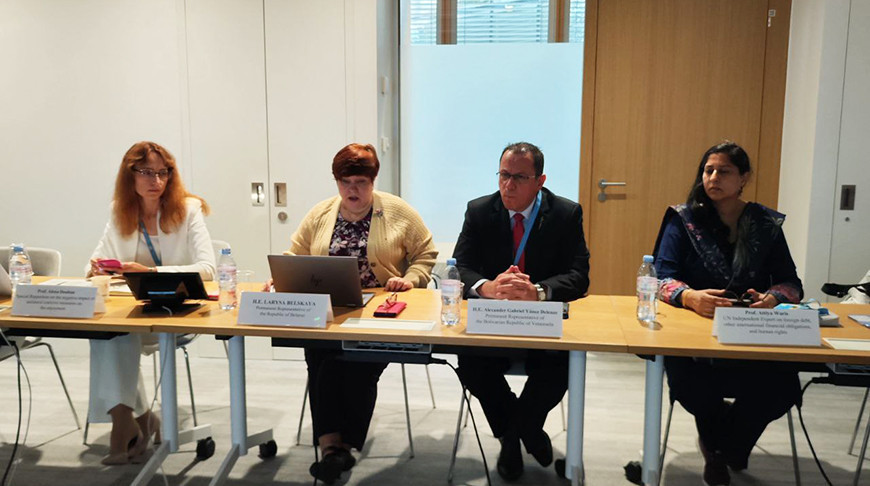
MINSK, 16 September (BelTA) – The West imposes sanctions to force a change in political course in the targeted countries, Belarus’ Permanent Representative to the UN Office in Geneva Larisa Belskaya said on the sidelines of the 60th session of the UN Human Rights Council in Geneva, BelTA learned from the Belarusian mission.
During the session, the Permanent Mission of Belarus arranged a side event dedicated to the book titled as Sanctions, Business and Human Rights. The book, edited by the UN special rapporteur on the negative impact of unilateral coercive measures on human rights, Professor of Belarusian State University Alena Douhan, was published as a compilation of articles by 29 researchers from different countries.
The book provides comprehensive analysis of the legality of sanctions under international law and evaluates their harmful effects on world economy, trade, and humanitarian affairs.
At the opening, Belarus’ permanent representative to the UN Office in Geneva stressed: “The West imposes sanctions for geopolitical purposes to change the political course of the governments of the targeted countries and are used as a weapon to undermine the economy of sovereign states.”
Belarus views this practice as politically motivated and illegal and calls for rejecting sanctions as a foreign policy instrument that undermines interstate dialogue and diplomatic conflict settlement.
The Belarusian diplomat noted that the discussions in the UN Human Rights Council on this issue demonstrate that most Global South nations share similar views.
Participants of the meeting, including representatives of China, Russia and other countries, praised the publication of the book, discussed the most relevant and promising areas of researching sanctions and developing UN documents on this topic.
During the session, the Permanent Mission of Belarus arranged a side event dedicated to the book titled as Sanctions, Business and Human Rights. The book, edited by the UN special rapporteur on the negative impact of unilateral coercive measures on human rights, Professor of Belarusian State University Alena Douhan, was published as a compilation of articles by 29 researchers from different countries.
The book provides comprehensive analysis of the legality of sanctions under international law and evaluates their harmful effects on world economy, trade, and humanitarian affairs.
At the opening, Belarus’ permanent representative to the UN Office in Geneva stressed: “The West imposes sanctions for geopolitical purposes to change the political course of the governments of the targeted countries and are used as a weapon to undermine the economy of sovereign states.”
Belarus views this practice as politically motivated and illegal and calls for rejecting sanctions as a foreign policy instrument that undermines interstate dialogue and diplomatic conflict settlement.
The Belarusian diplomat noted that the discussions in the UN Human Rights Council on this issue demonstrate that most Global South nations share similar views.
Participants of the meeting, including representatives of China, Russia and other countries, praised the publication of the book, discussed the most relevant and promising areas of researching sanctions and developing UN documents on this topic.













